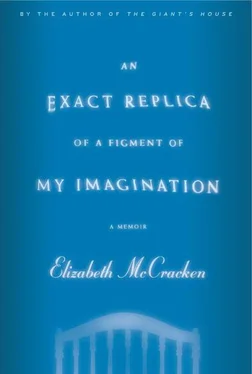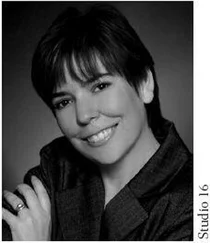Even now I feel a scalding, pleasureless relief that I pressed Claudelle to see me that morning. I wish I had pressed her more; I wish I had alarmed her into sending me immediately to the hospital — the one in Bordeaux, or the more terrifying one five minutes away from her office. But in the absence of that, I am relieved that when she said, Come at five, I’d said no. If I’d gone at five, Pudding would have been dead already. I wouldn’t have known when it had happened, and I don’t know how I would have gone forward in the world.
A year and three days after the morning I checked out of the hospital, Edward and I woke up in our second rented house in Saratoga Springs, an enormous Victorian we’d moved to a month before. The grubby rental house was around the corner. We might have stayed, but the owners decided to put it on the market, and so we ended up a block away, in a place that, it would turn out, had bats. We ate a small breakfast and wondered what the day would be like. We still weren’t people who could say under such circumstances, “By this time tomorrow, we’ll have a baby!”
I got dressed in a pair of stretchy black pants and a stretchy black top and put on lipstick and asked Edward to take my photograph: I hadn’t posed for a single picture for all of this pregnancy. I stood on the porch and smiled. It was a lovely spring day. Then we walked to the hospital.
Nurses are like anyone else when it comes to small talk, and while they went about their work they asked the usual questions. Boy or girl? Have you picked out a name? Are you wearing lipstick? To deliver a baby? At one point I had nurses on both arms looking for a likely vein for the IV. “You have very slender veins,” said one, pulling out a failed line.
“Shall we call for Marilyn?” another asked.
No, I thought, I wouldn’t name a baby Marilyn.
The mention of Marilyn, legendarily good at IVs, roused the competitive spirit of the first nurse. “Let me try again,” she said, and moved up my arm. This time when she failed she left behind an enormous amethyst bruise.
“Shall we call for anesthesia?” said the nurse who’d suggested calling for Marilyn, and I thought dreamily, Anesthesia. That’s a nice name .
The anesthesiologist came to put in the IV. He thought we looked familiar, and realized he’d seen us the night before at the DMV. That was somehow unnerving.
The nurse started the Pitocin drip. Dr. Knoeller came by.
“What are you thinking for names?” she asked.
We said we weren’t sure.
“Well,” she said, “I have a spare boy’s name, if it’s a boy.”
We stared at her, our hearts full of love, sure that this would be the best boy’s name ever.
“Lance,” she said.
Which immediately struck me as an unfortunate name for the son of a doctor.
Even happy labor stories can be excruciating in their details. The Pitocin drip went in at 9:30 a.m. I was hooked up to a fetal heart rate monitor and a contraction monitor, the same sorts I’d been on twice a week at the practice. After several hours I asked the young nurse, “Am I having any contractions yet?”
“ ’Bout every two to three minutes,” she said. I hadn’t felt a thing.
I was glad that Edward hadn’t been in the room for Pudding’s delivery: now, when I looked up at him from the delivery table it would be new, and when he told me we were almost there it would be new, it would be what I’d expected, and wholly unfamiliar. He opened a book to read to me. David Copperfield this time, which begins with a hair-raising birth. “Keep going,” I told him, admiring the great girth of the rest of the account of that baby’s life.
Dr. Knoeller stripped my membranes at 5:00. At 6:00 I asked for an epidural. At 7:36 —
I’m skipping some details: the baby’s heart began to decelerate during contractions. Dr. Knoeller came in to check me and was surprised to see that I was fully dilated. The baby’s heartbeat continued to decelerate during contractions. I became aware of the decelerations, even though I couldn’t feel the contractions: I could hear the beeping monitor. I started to watch the clock on the wall and could see that sometimes the heartbeats were in step with the second hand: sixty beats a minute, good for a grown-up but bad for a baby. My old fetish, the heartbeat. This monitor, threaded up me and onto the baby’s head, had a cold science-fiction beep. It was time to push, but it was hard when the effort came at the same time the heartbeat slowed: I tried to concentrate on my work, the work, but I couldn’t with that soundtrack. They put an oxygen mask on me so the baby would get more oxygen. Dr. Knoeller and the nurses told me that I was doing wonderfully, I was almost there. Edward was stroking my forehead and saying the same thing. Maybe they were lying. I suspected that they were. One of the nurses said to Dr. Knoeller — I didn’t hear her, thank God; Edward told me later — that the umbilical cord was wrapped around the baby’s neck. They told me to rest, and the heartbeat sped up. They told me to push and it slowed down again.
Then the heartbeat stopped.
Then my heart broke.
And then — look, we’re at 7:36 again — there was suddenly a toasty warm, hollering, wet baby on my chest, and Edward and I were laughing, and laughing, and laughing. He was actual! An actual baby, pulled from the dream of my body into the shocking wakefulness of earthly life. Maybe he thought the same of us: all that warmth, those dim voices, the love taps, the questions — I thought I’d made you up.
“It’s a little boy!” said Edward.
“Did you see?” said Dr. Knoeller.
“A little boy!” Edward told her.
He was small and skinny, six pounds and change, twenty inches long.
When Dr. Knoeller left she kissed us, and hugged us, and said, “Well, I don’t know about you, but I’m up for doing this again.”
Even so, we didn’t name him Lance.
In the hospital room, we tried out names. We hadn’t seriously played at this game since before Pudding was born. He looked absolutely unlike a Moses. He looked, in fact, like Edward, fair-haired and big-eyed and worried. “Isn’t he just like his father!” the nurses kept saying admiringly, as though this was a great trick the three of us had pulled off. Oh, he was beautiful, entirely himself.
We discussed Barnaby, Felix, Thomas, and Arthur. “The boy who wasn’t Mabel,” Lib said, when Edward called. We understood that Oscar was out: we were pretty sure that’s what Pudding’s name would have been, had he lived. This baby deserved a name of his own. But what would suit him?
“Barnaby Harvey,” I kept saying, and Edward shook his head.
“I’ve always loved the name Thomas,” he kept saying, and I shook my head.
“August,” he said, reading from the book of baby names I’d bought fifteen years before for fictional characters. “We could call him Augie, or Gus. Gus, I think.”
“Sidney,” I said.
“Maybe. Sidney. Sid. It’s a no-nonsense, tough name, Sid. Your mate down at the pub.”
The Sid I knew best was the husband of the president of my grandmother’s temple sisterhood, a sweet uxorious pharmacist. “Maybe not,” I said.
“Gus, then,” said Edward. “I think Gus.”
That night, when Edward went home to get some sleep, I tried it out. The baby was in his plastic hospital bassinet, swaddled into a neat and uncanny little package. I could see only his head in its mint green cap. “Hello, Gus,” I said. “Hello, Gussie. Hello, Gusling. Hello, Gosling.”
Sometime around 2:00 a.m., it had settled in my mind, and so I told the baby the story of his older brother. I really did: this isn’t literary fancifulness. He was a little, little baby, and I told him the story out loud, not knowing when we might tell him again: I wanted him to know how glad we were to see him, and how sad we were that he’d never know his older brother.
Читать дальше












